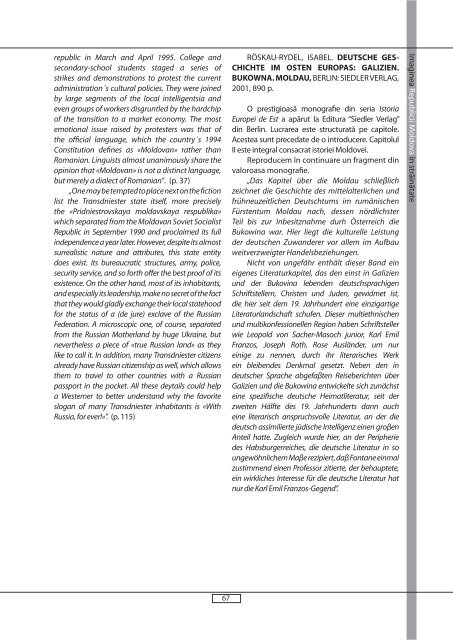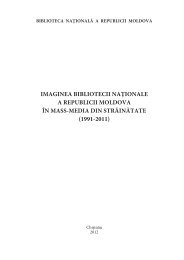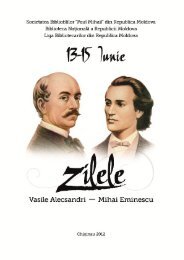download - Biblioteca NaÅ£ionalÄ a Republicii Moldova
download - Biblioteca NaÅ£ionalÄ a Republicii Moldova
download - Biblioteca NaÅ£ionalÄ a Republicii Moldova
You also want an ePaper? Increase the reach of your titles
YUMPU automatically turns print PDFs into web optimized ePapers that Google loves.
epublic in March and April 1995. College andsecondary-school students staged a series ofstrikes and demonstrations to protest the currentadministration΄s cultural policies. They were joinedby large segments of the local intelligentsia andeven groups of workers disgruntled by the hardchipof the transition to a market economy. The mostemotional issue raised by protesters was that ofthe official language, which the country΄s 1994Constitution defines as «<strong>Moldova</strong>n» rather thanRomanian. Linguists almost unanimously share theopinion that «<strong>Moldova</strong>n» is not a distinct language,but merely a dialect of Romanian”. (p. 37)„One may be tempted to place next on the fictionlist the Transdniester state itself, more preciselythe «Pridniestrovskaya moldavskaya respublika»which separated from the <strong>Moldova</strong>n Soviet SocialistRepublic in September 1990 and proclaimed its fullindependence a year later. However, despite its almostsurrealistic nature and attributes, this state entitydoes exist. Its bureaucratic structures, army, police,security service, and so forth offer the best proof of itsexistence. On the other hand, most of its inhabitants,and especially its leadership, make no secret of the factthat they would gladly exchange their local statehoodfor the status of a (de jure) exclave of the RussianFederation. A microscopic one, of course, separatedfrom the Russian Motherland by huge Ukraine, butnevertheless a piece of «true Russian land» as theylike to call it. In addition, many Transdniester citizensalready have Russian citizenship as well, which allowsthem to travel to other countries with a Russianpassport in the pocket. All these deytails could helpa Westerner to better understand why the favoriteslogan of many Transdniester inhabitants is «WithRussia, for ever!»”. (p. 115)RÖSKAU-RYDEL, ISABEL. DEUTSCHE GES-CHICHTE IM OSTEN EUROPAS: GALIZIEN.BUKOWNA. MOLDAU, BERLIN: SIEDLER VERLAG,2001, 890 p.O prestigioasă monografie din seria IstoriaEuropei de Est a apărut la Editura “Siedler Verlag”din Berlin. Lucrarea este structurată pe capitole.Acestea sunt precedate de o introducere. CapitolulII este integral consacrat istoriei Moldovei.Reproducem în continuare un fragment dinvaloroasa monografie.„Das Kapitel über die Moldau schlieβlichzeichnet die Geschichte des mittelalterlichen undfrühneuzeitlichen Deutschtums im rumänischenFürstentum Moldau nach, dessen nördlichsterTeil bis zur Inbesitznahme durh Österreich dieBukowina war. Hier liegt die kulturelle Leistungder deutschen Zuwanderer vor allem im Aufbauweitverzweigter Handelsbeziehungen.Nicht von ungefähr enthält dieser Band eineigenes Literaturkapitel, das den einst in Galizienund der Bukovina lebenden deutschsprachigenSchriftstellern, Christen und Juden, gewidmet ist,die hier seit dem 19. Jahrhundert eine einzigartigeLiteraturlandschaft schufen. Dieser multiethnischenund multikonfessionellen Region haben Schriftstellerwie Leopold von Sacher-Masoch junior, Karl EmilFranzos, Joseph Roth, Rose Ausländer, um nureinige zu nennen, durch ihr literarisches Werkein bleibendes Denkmal gesetzt. Neben den indeutscher Sprache abgefaβten Reiseberichten überGalizien und die Bukowina entwickelte sich zunächsteine spezifische deutsche Heimatliteratur, seit derzweiten Hälfte des 19. Jahrhunderts dann aucheine literarisch anspruchsvolle Literatur, an der diedeutsch assimilierte jüdische Intelligenz einen groβenAnteil hatte. Zugleich wurde hier, an der Peripheriedes Habsburgerreiches, die deutsche Literatur in soungewöhnlichem Maβe rezipiert, daβ Fontane einmalzustimmend einen Professor zitierte, der behauptete,ein wirkliches Interesse für die deutsche Literatur hatnur die Karl Emil Franzos-Gegend”.Imaginea <strong>Republicii</strong> <strong>Moldova</strong> în strãinãtate67
















